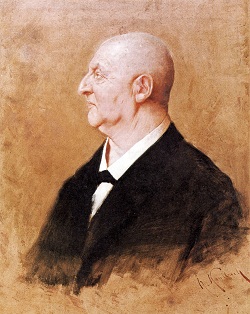Born:
September 4, 1824; Ansfelden, Austria
Died:
October 11, 1896; Vienna, Austria
Nationality:
Austria
Occupation:
Composer, organist, music theorist
Anton Bruckner was an Austrian composer,
organist, and music theorist, born on September 4, 1824 and died on October 11,
1896, most famous for his symphonies, masses, Te Deum and motets.

The house in Ansfelden, Austria, where Anton Bruckner was born
His
symphonies are regarded as a symbol of the final stage of Austro-German
Romanticism due to their rich harmony, strong polyphonic character and long
playing time. Bruckner's works helped to define contemporary musical radicalism
due to their dissonances, unprepared modulations, and roving harmonies.

Anton Bruckner, Hermann von Kaulbach
Unlike other musical radicals such
as Richard Wagner and Hugo Wolf, Bruckner was a very humble figure to other
musicians, especially Wagner. However, this apparent dichotomy between Bruckner
the person and Bruckner the composer was an obstacle to correctly assessing his
life.

A monument of Anton Bruckner, Stadtpark (Vienna)
Hans von Bülow, conductor, pianist and composer of the German Romantic
era, described him as "half genius, half simpleton.” Bruckner was critical
of his compositions and often reworked his compositions, many of which have
multiple versions.

Anton Bruckner memorial in front of ABC Ansfelden, Austria
There were a number of detractors
of his work, especially the symphonies, among which the most notable are
Austrian critic Eduard Hanslick and supporters of Johannes Brahms. They pointed
to Bruckner's inclination to revise his works, as well as its large size and
use of repetition, along with his indecision in choosing his preferred version
and frequent assistance of his colleagues in making his works.
On the other
hand, however, Bruckner was greatly respected by his friend Gustav Mahler and
his subsequent composers.

Anton Bruckner arrives in Heaven, Otto Böhler
Bruckner died in Vienna in 1896 at
the age of 72. He was buried in the crypt of the monastery church at Sankt
Florian, just below his favorite organ. He had always had a morbid fascination
with death and corpse, and left explicit instructions regarding the embalming
of his corpse.

The Bruckner Organ in Sankt Florian
The Anton Bruckner Private University for Music, Drama, and
Dance, a higher education institution in Linz, close to his hometown Ansfelden,
was named after him in 1932, and The Bruckner Orchestra Linz was also named
after him.

Old building of Anton Bruckner Private University

Bruckner Orchestra Linz
Thank you.

Anton Bruckner monument, Linz






No comments:
Post a Comment